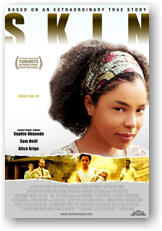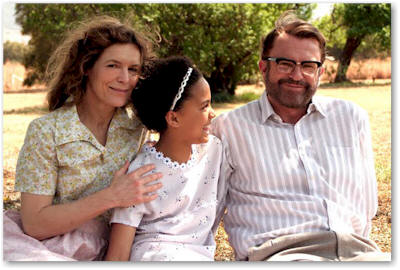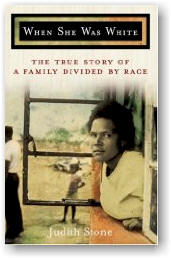Skin
Film Reviewed by Kam Williams
 Skin
Skin
Click to order via Amazon
Rated PG-13 for violence, sexuality and mature themes.
Running time: 107 minutes
Studio: Jour de Fete Films
Distributor: The Little Film Company
Film Review by Kam Williams
Excellent (4 stars)
| Film was adapted from this book When She Was White: The True Story of a Family Divided by Race
During the worst years of official racism in South Africa, the story of one young girl gripped the nation and came to symbolize the injustice, corruption, and arbitrary nature of apartheid. Born in 1955 to a pro-apartheid Afrikaner couple, Sandra Laing was officially registered and raised as a white child. But when she was sent to a boarding school for whites, she was mercilessly persecuted because of her dark skin and frizzy hair. Her parents attributed Sandra’s appearance to an interracial union far back in history; they swore Sandra was their child. Their neighbors, however, thought Mrs. Laing had committed adultery with a black man. The family was shunned. And when Sandra was ten, she was removed from school by the police and reclassified as "coloured." |
Until 1994, South Africa’s system of Apartheid forbade people of different ’races’ to use the same stores, to attend the same schools or to reside under the same roof. Those oppressive segregation laws came to rip an Afrikaner family apart after the wife gave birth to a baby with dark skin and nappy hair in 1955.
Abraham (Sam Neill) and Sannie Laing (Alice Krige) raised a lot of eyebrows when they brought a brown newborn back from the hospital. While some neighbors suspected that the wife must have cheated, doctors did a blood test which determined that Abraham was in fact the father.
So, the couple had young Sandra (Sophie Okonedo) declared officially white and did their best to raise her in their lily white neighborhood. But as soon as she started school, the little girl was teased by her classmates and even beaten by teachers until complaints from other parents about the ’kaffir’ on campus forced the principal to expel Sandra. And when the authorities subsequently reclassified their daughter as ’coloured,’ the Laings had to register her as a domestic servant just so that she could live at home legally.
This real-life nightmare is the subject of Skin, a heartbreaking bio-pic based on Judith Stone’s best seller ’When She Was White: The True Story of a Family Divided by Race.’ Adapted to the screen by Anthony Fabian, the picture effectively exposes the silliness of arbitrary groupings based on skin color.

Unfortunately, Apartheid really did exist, and the case of the Laings turned terribly tragic, since Sandra ended up estranged from her parents by the age of 15. She ran away from home pregnant to live on the other side of the proverbial tracks, in a black township with a married man. There, she proceeded to make a series of self-destructive choices, bearing numerous children out of wedlock she had to surrender to foster care.
Penniless, she attempted to reconcile with her folks, only to be told by her mother never to call or visit again. A frightening primer on how untreated racism can make lead someone to abandon, even hate their own offspring.

Read More AALBC.com Film Reviews

